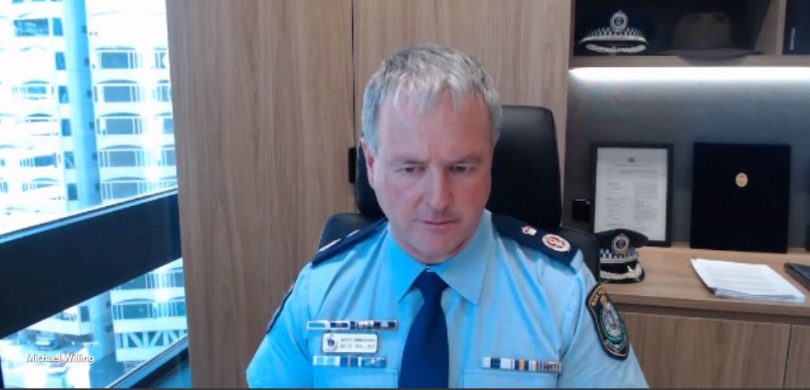
Assistant Commissioner of NSW Police Michael Willing briefs regional media. Photo: Kim Treasure.
UPDATED 3:00 PM: NSW Deputy Premier John Barilaro says health authorities are still “baffled” as to the source of repeated incidents of COVID-19 virus fragments in sewage on the Far South Coast.
Speaking about today’s revelations of a third incident of the virus in Merimbula’s sewage and an initial discovery in Thredbo’s sewage, Mr Barilaro said “it’s a needle in a haystack moment”.
“This is the third time we have seen it in Merimbula, we’ve seen some in Cooma and now we have had it for the first time in Thredbo,” he said. “The reality here is we know there’s movement along that region, we know there are cases either in Sydney or in Canberra, we know there’s that interconnectivity.
“It could be freight drivers that have been picked up elsewhere that have gone through the region. We don’t know.
“This is the fishing exercise, or the needle in the haystack moment where you try to work through.
“It’s a case of watch and see, and stay vigilant.”
Mr Barilaro said he remained quietly confident that “big parts of NSW can open and should open after 10 September”.
Assistant Commissioner of NSW Police Michael Willing also briefed regional media today (1 September).
He responded to claims of a lack of a police presence on roads connecting the ACT and the Monaro by warning that police were highly mobile and were being used to target areas of concern.
“We can move resources around as required,” Assistant Commissioner Willing said. “The resources are there. I’ll pass any concerns on to the regional commander, but please be assured police will be out there.”
10:30 AM: Fragments of the COVID-19 virus have been detected in the Merimbula sewage treatment plant for the third time, while Thredbo is now an area of concern after sewage there returned a positive result.
The Merimbula detection was from a sample taken over a period from Sunday, 29 August to the morning of Monday, 30 August. Samples from Bega, Bermagui and Eden came up clear for the same period.
Bega Valley Shire Mayor Russell Fitzpatrick said while there were still no known cases in the Bega Valley, the persistent presence of fragments continued to signal the possibility of undetected cases in the community.
“The detection of fragments of the virus at the Merimbula sewage treatment plant three times in two weeks is of concern,” Cr Fitzpatrick said.
“The Merimbula sewage treatment plant serves approximately 7,000 people covering Merimbula, Pambula, Pambula Beach, South Pambula, Mirador, Berrambool and parts of Millingandi. Also regularly emptied commercial pump-out tank systems in the shire feed into the Merimbula Sewage Treatment Plant.
“We urge people across the Bega Valley, and in the Merimbula and associated communities particularly, to get tested if they have any cold-like symptoms, such as headache, nausea, sore throat, runny nose, cough, loss of smell or taste, or fever.
“If symptoms appear, people must isolate and get tested immediately, and remain isolated until a negative result is received.”
Council is sending samples from the sewage treatment plants in Eden, Bermagui, Merimbula and now Bega twice weekly to NSW Health for testing.
“Since the virus fragments were first detected last week, the number of people getting tested for COVID-19 has been relatively low,” Cr Fitzpatrick said.
“It’s critical we see higher COVID-19 testing numbers if we are going to find the source of these virus fragments.”
South East Regional Hospital’s COVID-19 drive-through testing clinic is open Monday to Sunday from 8:00 am to 4:00 pm.
Meanwhile, the Southern NSW Local Health District says there’s also been a positive detection of the virus in Thredbo’s sewage system. This follows two previous detections at Cooma’s sewage treatment plant last week.
Deputy Premier John Barilaro is expected to provide more details at this afternoon’s briefing.
CORRECTION: This article originally stated that sewage fragments were identified in Jindabyne. They have been located in Thredbo.







